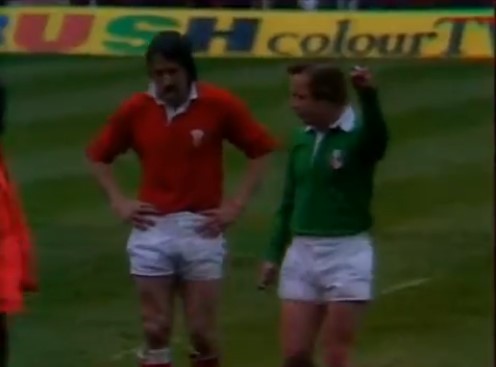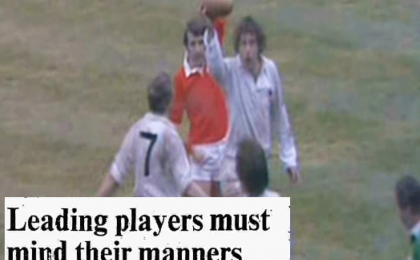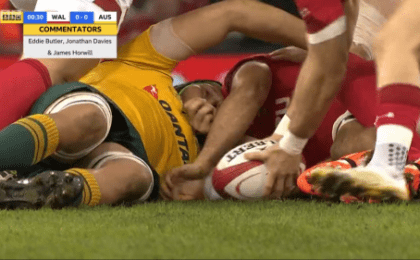Our recent piece looking at each occasion Wales benefited from playing against shorthanded opponents was quite a success. So we’ve decided to follow it with another stroll down a red mist tinged memory lane, this time taking a look at the fateful moments that saw Wales reduced to inferior numbers.
In 745 Welsh Test matches since 1881, eight Welsh players have received their marching orders (compared to 12 opposing players).
As mentioned in the last article, referees have had the option to dismiss players since 1888. But it was not until 1977, Wales’s 315th international, that an official exercised this power. Norman Sanson made the moment extra special too, sending off a player from each team.
Here are some interesting stats about the eight Welsh sending offs:
- Wales have only won two from eight games when they’ve had a player dismissed (Ireland in 1977 and Argentina in 2018). However, the Irish game saw an Irish player dismissed too, so when a full man down, the Dragons have just one solitary victory. The red card in this 2018 win occurred in the 82nd minute and had no impact on the result.
- Wales have had two players dismissed against France (1990 and 2011) and two against England (1980 and 1995).
- Three of the sending offs occurred in a home game, three in away games and two in neutral venues.
- Two sendings off came in World Cups, four in the Five Nations and two in non-tournament Test matches.
- Wales have never had a player dismissed in the modern Six Nations.
- Five of the sending offs were in the amateur era, and three in the professional era (the first of which was in Wales’s first ever professional game).
- Four of the dismissals took place in the first half of a game.
- The nationality of the officials who gave the marching orders are Ireland (3), France (2), England (1), South Africa (1) and Australia (1).
Below are the details of each time Wales’s opponents have seen a player dismissed.
MATCH 315: Wales 25 Ireland 9 (1977)
Venue: Cardiff Arms Park
Tournament: Five Nations
Player sent off: Geoff Wheel
Reason: Fighting (37th minute)
Referee: Norman Sanson (Scotland)
The only time Wales and their opponents both had players sent off in the same match. Geoff Wheel was dismissed for fighting with Ireland’s Willie Duggan, who was also given the finger of doom from Norman Sanson. Before this double whammy, no players had ever been sent off in a Championship game.
MATCH 331: England 9 Wales 8 (1980)
Venue: Twickenham
Tournament: Five Nations
Player sent off: Paul Ringer
Reason: Dangerous tackle (14th minute)
Referee: David Burnett (Ireland)
Until 2011, this was the most famous sending off in Welsh rugby history. In the build up to the game, newspapers had been full of the concern about the high levels of thuggery in rugby and the tension and menace in the opening stages still shines through 41 years later.
Flanker Paul Ringer was dismissed in the 14th minute, and to this day old timers contest the legitimacy of the sending off, blaming the media campaign waged in the previous days for the call. Ringer had been singled out in some quarters ahead of the game as one who was likely to be at the thick of any dark arts in the Twickenham clash. It is fair to say that he didn’t do himself many favours in the opening stages.
Here are some of the flashpoints from the build up to the sending off::
- Ringer’s first major contribution comes around the 6:15 mark when he takes exception to England and Cardiff number right John Scott’s action at a maul.
- Gareth Davies gives a hint of a swinging arm/loose hand when charging English full-back Dusty Hare in this clip. An unknighted Clive Woodward takes offence.
- The first warning to the players occurs after this scuffle, with captains Jeff Squire and Bill Beaumont addressed afterwards by referee David Burnett.
- Ringer launches a nasty knee into the back of Dusty Hare, leaving the Leicester man in need of treatment.
- Another scuffle, this time after the home pack, Roger Uttley in particular, respond to a loose boot of some kind from Wales’s Allan Martin.
- Ringer shoulder charges Clive Woodward.
- The famous moment where Ringer tackles John Horton.
Despite the card, if anyone on the Welsh team had had their kicking boots on they would have won. Wales outscored England two tries to zero, but failed to convert either. Winger Elgan Rees was criticised for failing to go nearer the posts and making the following conversion needlessly difficult after his score. England went on to their first Grand Slam since 1957, Wales went into decades of decline and despair.
MATCH 374: Wales 6 New Zealand 49 (1987)
Venue: Ballymore, Brisbane
Tournament: World Cup
Player sent off: Huw Richards
Reason: Punch (70th minute – approx)
Referee: Kerry Fitzgerald (Australia)
If ever you want to see a concrete example of home much the game has changed since professionalism and global television audiences, here is a clip for you.
Second-row Huw Richards dismissal was the correct call. But younger viewers in particular will perhaps be shocked that Wayne Shelford, who swiftly entered the fray and floored Richards, not only stayed on the field, but got to lift the World Cup a few days later. Different times.
MATCH 390: Wales 19 France 29 (1990)
Venue: Cardiff Arms Park
Tournament: Five Nations
Player sent off: Kevin Moseley
Reason: Stamping (36th minute)
Referee: Fred Howard (England)
Pontypool second-row Kevin Moseley got an incredible 32 weeks from the WRU for stamping on French wing Marc Andrieu. Moseley has since protested his innocence (the video below is not a good look though), but has admitted to landing a solid punch on France’s Olivier Roumat a few minutes before. So, you know, swings and roundabouts.
MATCH 434: Wales 9 England 23 (1995)
Venue: Cardiff Arms Park
Tournament: Five Nations
Player sent off: John Davies
Reason: Kicking (65th minute)
Referee: Didier Mene (France)
Another miserable Welsh Five Nations campaign, it was the 1990s after all, saw Wales get whitewashed just a year after winning the title. Prop John Davies was sent off for kicking England’s Ben Clarke. Interestingly, to allow competitive scrums, flanker Hemi Taylor was removed and prop Hugh Williams-Jones came on to shore up the front row. However, it was to be another month before this type of replacement was officially sanctioned by the IRB.
It was also the first ever time an actual red card was brandished in the Five Nations. Until then players had been given the pointy finger of doom by referees.
MATCH 440: South Africa 40 Wales 11 (1995)
Venue: Ellis Park
Tournament: None (Test)
Player sent off: Garin Jenkins
Reason: Punching (79th minute)
Referee: Joel Dume (France)
This was Wales’s first game of the professional era and also the first time a Welsh player was sent off as a pro. Ironically, this game is remembered for an act of thuggery that never got punished. Kobus Wiese’s cheap shot on Derwyn Jones in the first five minutes has gone down into rugby infamy. Footage of the punch is easily found on YouTube, but Garin Jenkins’s red card for hitting Joost van der Westhuizen is not. Jenkins was on as a replacement flanker, rather than hooker.
MATCH 631: Wales 8 France 9 (2011)
Venue: Eden Park
Tournament: World Cup
Player sent off: Sam Warburton
Reason: Tip tackle (18th minute)
Referee: Alain Rolland (Ireland)
Arguably the most famous dismissal in rugby history, Sam Warburton’s 18th minute tackle still generates emotions in the hearts of Welsh fans to this day. In another sign of how much the game has changed, the commentary before and after the red card is fascinating to listen to now. In 2011, the red card would seem inevitable. But back in 2011 it was, no pun intended, a tipping point in how the game was officiated. Not only did the commentators miss the sending off, even some of Warburton’s team mates did. Apparently Jonathan Davies, playing centre, didn’t even realise for ten minutes Warburton was gone for good.
MATCH 713: Argentina 12 Wales 30 (2018)
Venue: Estadio Brigadier Lopez
Tournament: Test series
Player sent off: Ross Moriarty
Reason: Chokehold (82nd minute)
Referee: Jaco Peyper (South Africa)
Number eight Ross Moriarity was sent off for what the BBC described as a “a prolonged headlock on Pumas outside-half Nicolas Sanchez” after responding to an off the ball altercation in the 82nd minute. Even the Pumas’ physio got involved in the aftermath.
Moriarty later responded to online criticism of his red, saying: “I appreciate the hate messages… when you hide behind your keyboard you maggots.”
Ross Moriarty retaliation. Holds Nicolás Sánchez in a chokehold. Red card. pic.twitter.com/UgVVZZHpZ7
— Paul Tait (@AmericasOval) June 16, 2018
Order your copy of An Illustrated History of Welsh Rugby: Fun, Facts and Stories from 140 Years of International Rugby here.




